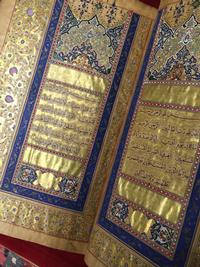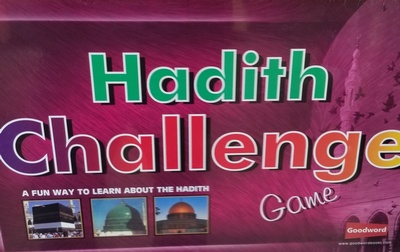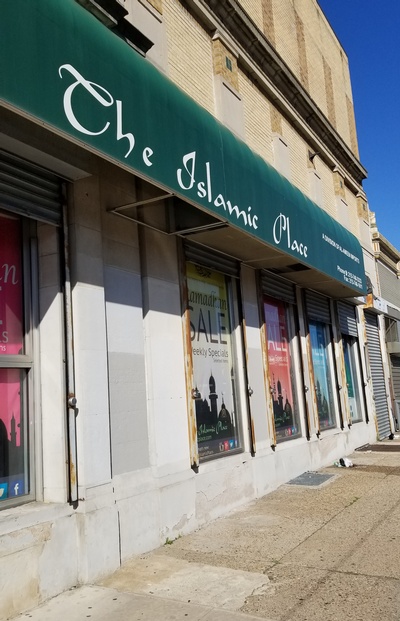What are the most popular Googled questions about Ramadan?
Here's what we found: When does Ramadan begin and end in 2021? What is allowed and not allowed during Ramadan? What does Ramadan celebrate? What can’t you do during Ramadan? And, can you kiss during Ramadan?
My coworker Shahadah Abdul Rashid and I thought it would be fun to tackle these questions together.
Joe: When does Ramadan start and stop this year (2021)?
Shahadah: The Islamic holy month of Ramadan begins approximately on Monday, April 12, 2021. If you notice, I said approximately because the calculations of all months of the Islamic calendar are lunar based. We calculate with visual sightings and track the different phases of the moon to begin and end each month in either 29 or 30 days. Ramadan will conclude with a large and joyous celebration called the Eid Al Fitr.
What does Ramadan celebrate?
Ramadan is one of the holiest months in the Islamic faith because it commemorates when the first chapters of the Holy Quran were revealed by Allah (God in Arabic) to our most beloved Prophet, Muhammad (May peace and blessings be upon him). When we mention this Prophet, we always wish peace and blessings upon him because although he was a humble servant of God, he is our humanly example of love, mercy, wisdom, honor, and overall a perfect human. Some people have heroes and celebrities as role models. We worship Allah (God) alone, and have Prophet Muhammad (Peace and Blessing Upon Him), the other Prophets and their wives, as revealed in the Quran as examples of devotion to Allah (God).
What are you generally allowed and not allowed to do during Ramadan?
During Ramadan, we fast from daybreak until the sun sets in the evening, which will last this year around 14 hours (with a few minutes added on each day). Outwardly, it may seem as if we are only abstaining from food and drinks all day but it’s actually much more. For the duration of the day, we are abstaining from food, drinks, intercourse/intimacy, sinful speech, and behaviors. The most important part of fasting is not what we abstain from but how we engage in and increase while fasting. We increase in prayer, spirituality, devotion, charity, giving, good deeds, patience, and overall reverence of Allah (God). Someone once asked me if it was a spiritual diet. My answer is no, more of a lifestyle change that we strive to continue. Also, I forgot to mention that the physical parts of fasting (abstaining from food and drinks) are only obligatory for those who are able to perform it. Mercy has been placed among the elderly, sick, and children, but they still engage in and abstain from the other things mentioned above.
Since it was listed in my Google search, can you kiss during Ramadan?
The fact that so many people have Googled this question makes me giggle. Yes, one can kiss during Ramadan, but it's not advised while fasting, especially if it's romantically motivated (above I spoke about abstaining from intimacy during the day). This month is not about indulging in worldly pleasures; rather, it's about reaffirming our devotion to the Almighty Creator and Pillars of Islam—fasting during Ramadan, the testimony of faith, prayer, alms-giving, and the pilgrimage to Mecca.
Bonus question: What’s your favorite part of Ramadan?
This question makes me smile so much. Like many Muslims, I await this month all year and use it as a fresh start for me, religiously. Also, I enjoy the fast pace of it all. Everyone around me is worshipping in the same way, and at least for this month, Muslims are not viewed as "other." We are practicing our religion without much scrutiny. A typical day entails waking up at 4 a.m. for breakfast, followed by prayer, on to typical work duties (yes, we still work and engage in our worldly responsibilities), more prayer, and then breaking the fast when the sun goes down. After the sun goes down, we either eat with family every night or at the masjid. After another prayer, we make a special Ramadan-only night prayer called Tarawih, in which a portion of the Quran is recited every night until its completion. For either 29 or 30 days, we are blessed with the strength to do this daily routine, and it's an amazing thing, Al Hamdulilah (All praises be to God). During this month, the world stops and revolves around our devotion to God, a Muslim’s goal for this lifetime. Worship to God in every action, comradery with loved ones, and being a good human. Ramadan makes me happy!
A Recap of Manuscripts of the Muslim World
Shahadah and I began our collaboration in 2019 during a Skills Training for Community-Centered Libraries program, a project made possible in part by the Institute of Museum and Library Services through the Laura Bush 21st Century Librarian program, designed to help library staff identify, create, and evaluate programs in order to better serve their communities. At the time, the Free Library was awarded a grant to digitize and catalog about 100 Islamic manuscripts and over 800 paintings (currently in the process), part of a three-year grant-funded project supported by a Digitizing Hidden Collections grant from the Council on Library and Information Resources (CLIR). The grant was made possible by the Andrew W. Mellon Foundation. During the digitization process, it became clear that some objects in the collection were in need of conservation. Thanks to a Federal Save America's Treasures grant administered by the Institute of Museum and Library Services, we are able to fund a conservation effort and protect the items in our collection. We call this entire project Manuscripts of The Muslim World.
It All Came Together: Community Outreach. Share Your Ideas, Read below!
When I talked to Shahadah about Manuscripts of The Muslim World, we both felt that this project would be of great interest to members of Philadelphia's Black Muslim Community, especially if supplemented by community-centered programming. This would enable the Free Library to reach out, recognize, and effectively engage community members in new and creative ways. Black Muslims, or indigenous Muslims, account for the largest racial group of Muslims in the United States, constituting more than a fifth of all Muslim Americans. This Philadelphia Tribune article is an excellent summary of the history of Black Muslims in the United States and Philadelphia.
Community Outreach Before And During Covid-19.
On January 9, 2019, we launched our first outreach program. We invited five Philadelphia Imams to meet with us in person in our Rare Book Department. During this much-anticipated visit, we displayed a selection of rare, handwritten manuscripts which included a beautifully decorated five-hundred-year-old, handwritten Quran. The visit was unforgettable, full of energy, optimism, and lively dialog. In late February 2020, Covid-19 hit and forced us to stay home. The pandemic interrupted our scheduled in-person programs, but it did not defeat our programming efforts. On May 12, 2020, we presented QuranTeen a live virtual program, featuring Assistant Imam Hudhaifah AbdulHayy, who gave a brilliant talk on how the Quran could inspire us all during the pandemic. Abdullah Ibn Hanif, a 16-year-old Philadelphia teen, then gave a remarkable and inspiring recitation by heart from a selected passage in the Quran. Then, on December 21, 2020, we recorded a special podcast episode titled “Three Stories From Indigenous Muslim Philadelphians." This special podcast is an oral history record, giving voice to three members of our Muslim community.
A Generous Programming Grant To Be Announced
Recently, we were excited to receive the news that Manuscripts of the Muslim World has been awarded a generous grant to fund robust public programming! This grant will enable us to hire an Islamic Community Liaison Specialist, dedicated to creating and managing exciting community programs, including permanent and traveling exhibitions and Arabic language classes. Details of the grant will soon follow once it is officially announced. This is great news, especially since it was Caitlin Goodman, Curator of the Rare Book Department, who had been championing community-curated Islamic exhibitions back in 2018.
Future Program Highlight: Islamic Traveling Treasures
One upcoming program we are excited about is the Islamic Traveling Treasures, a program modeled on the Free Library's Traveling Treasures. The Islamic Traveling Treasures will contain objects which participants of all ages are encouraged to touch and hold. The objects to be selected will reflect the Islamic Life of Philadelphia's Black Muslim Community. The Islamic Traveling Treasures will circulate like library books: free of charge, and for anyone to check out. Recently, we visited a few stores in West Philly, researching items to include, like a Hadith Challenge game, and other items one could find in a traditional Muslim home.
We'd love to hear your ideas! What objects would you include in the Islamic Traveling Treasures? Do you have fun programming ideas to share? Email your suggestions to Joe at shemtovj @ freelibrary.org.
Have a question for Free Library staff? Please submit it to our Ask a Librarian page and receive a response within two business days.



